
Hao Wu is a Chinese film director, producer and writer living in the US. Wu was also a blogger known as Tian Yi. He is otherwise best known for his feature-length documentary, People's Republic of Desire, winner of the Grand Jury Award for Best Documentary Feature at the 2018 South by Southwest, All in My Family, a Netflix Original Documentary, and 76 Days, about the early days of the COVID-19 outbreak in Wuhan, China. In 2021, Wu won a Peabody Award and a Primetime Emmy Award for Exceptional Merit in Documentary Filmmaking for 76 Days.

Benedict Wong is a British actor. He began his career on stage before starring in the film Dirty Pretty Things (2003), which earned him a British Independent Film Award nomination, and the BBC sitcom 15 Storeys High (2002–2004). This was followed by roles in the films On a Clear Day (2005), Sunshine, Grow Your Own, and Moon (2009), and the CBBC series Spirit Warriors (2010).
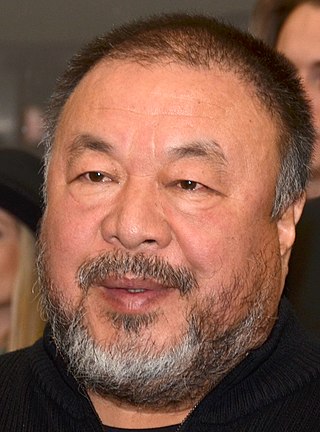
Ai Weiwei is a Chinese contemporary artist, documentarian, and activist. Ai grew up in the far northwest of China, where he lived under harsh conditions due to his father's exile. As an activist, he has been openly critical of the Chinese Government's stance on democracy and human rights. He investigated government corruption and cover-ups, in particular the Sichuan schools corruption scandal following the collapse of "tofu-dreg schools" in the 2008 Sichuan earthquake. In 2011, Ai Weiwei was arrested at Beijing Capital International Airport on 3 April, for "economic crimes". He was detained for 81 days without charge. Ai Weiwei emerged as a vital instigator in Chinese cultural development, an architect of Chinese modernism, and one of the nation's most vocal political commentators.

The Free Ai Weiwei street art campaign was a series of protests during the PRC government's secret detention of Chinese artist Ai Weiwei for 81 days in 2011, organised by Hong Kong artists and art supporters. Various slogans calling for the immediate release of the artist such as "Free Ai Weiwei", and "Who's afraid of Ai Weiwei" accompany stencilled images of Ai were applied onto pavements, pedestrian overpass, and building walls all over Hong Kong, and similar posters and signs were displayed worldwide.
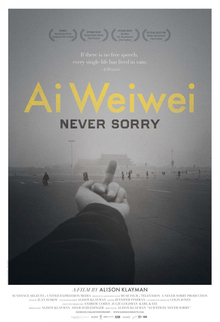
Ai Weiwei: Never Sorry is a 2012 documentary film about Chinese artist and activist Ai Weiwei, directed by American filmmaker Alison Klayman.
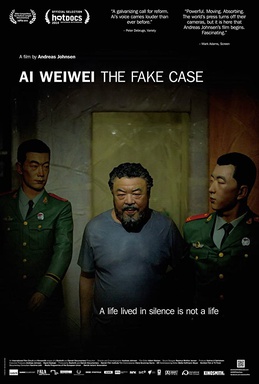
Ai Weiwei: The Fake Case is a 2013 documentary film about Chinese artist and activist Ai Weiwei, directed by Danish filmmaker Andreas Johnsen. The film won Best 2014 Documentary in Danish Film Critics Association's 67th Bodil Awards, played in the official selection of 2014 Hot Docs Canadian International Documentary Festival in Toronto and International Documentary Film Festival Amsterdam.

Alison Klayman is an American filmmaker and journalist best known for her award-winning 2012 documentary Ai Weiwei: Never Sorry.

Andrew "Andy" Cohen is a three-time Emmy nominated independent filmmaker and journalist whose recent film,To Kill a Tiger, is nominated for a 2024 Academy Award for Best Feature Documentary.

On 23 January 2020, the central government of China imposed a lockdown in Wuhan and other cities in Hubei in an effort to quarantine the center of an outbreak of COVID-19; this action was commonly referred to as the Wuhan lockdown. The World Health Organization (WHO), although stating that it was beyond its own guidelines, commended the move, calling it "unprecedented in public health history".

The COVID-19 pandemic in mainland China is part of the worldwide pandemic of coronavirus disease 2019 (COVID-19) caused by severe acute respiratory syndrome coronavirus 2 (SARS-CoV-2). China was the first country to experience an outbreak of the disease, the first to impose drastic measures in response, and one of the first countries to bring the outbreak under control.
The COVID-19 pandemic in Hubei, part of the global COVID-19 pandemic, was the first identified outbreak of the pandemic, appearing as a cluster of mysterious pneumonia in Wuhan, the provincial capital of Hubei, China. A Wuhan hospital notified the local Center for Disease Control and Prevention (CDC) and health commissions on December 27, 2019. On December 31, Wuhan CDC admitted that there was a cluster of unknown pneumonia cases related to the Huanan Seafood Wholesale Market after the unverified documents appeared on the Internet. The outbreak soon drew nationwide attention, with the National Health Commission (NHC) in Beijing sending medical experts to Wuhan the next day. On January 8, a new coronavirus was identified as the cause of the pneumonia. The sequence of the virus was soon published on an open-access database. Measures taken by China have been controversial. They were praised by the World Health Organization (WHO) for improvements over SARS-CoV-2 responses, but maligned by many in the international community for being slow to publicly disclose key facts or deceptive about the outbreak and for aggressively censoring information related to the outbreak and public discontent from citizens online.

This article documents the chronology and epidemiology of SARS-CoV-2 in 2019, the virus that causes coronavirus disease 2019 (COVID-19) and is responsible for the COVID-19 pandemic. The first human cases of COVID-19 known to have been identified were in Wuhan, Hubei, China, in December 2019. It marked the beginning of the 2019–2020 COVID-19 outbreak in mainland China.
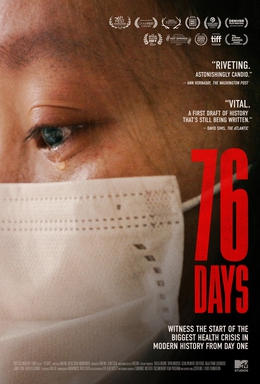
76 Days is a 2020 Chinese-American documentary film directed by Hao Wu, Weixi Chen and an anonymous third. Set in the early days of the COVID-19 pandemic, it captures the struggles and human resilience in the battle to survive the spread of the disease in Wuhan, China.
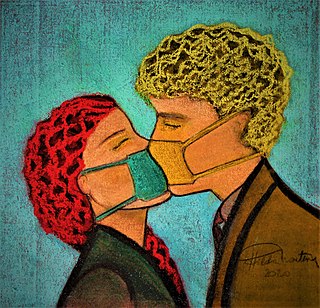
The COVID-19 pandemic swept the world in the early months of 2020, causing massive economic and social disruption. In addition to the disease itself, populations have often dealt with lockdowns, shortages and pandemic fatigue, political and cultural turmoil. This has made the pandemic era a time of exceptional stress. The pandemic has driven some people to seek peaceful escapism in media, but others towards fictional pandemics as an alternate form of escapism.

Days and Nights in Wuhan is a 2021 state-backed documentary film detailing the COVID-19 pandemic in Wuhan, Hubei, China. The film was directed by Cao Jinling, and co-produced by the Chinese Communist Party and the Hubei Propaganda Department. Days and Nights in Wuhan was released in China on January 22, 2021. It is unknown if there are plans to release the film outside of China.
Lockdown is a 2022 global pandemic thriller film written and directed by Bizhan Tong. The film stars Xander Berkeley and Kevin Leslie, with an international cast including Anita Chui, John Savage, Alix Wilton Regan, Pamela Nomvete, and Mike Leeder in supporting roles.
Ximei is a 2019 American documentary directed by Andy Cohen, co-directed by Gaylen Ross and produced by Ai Weiwei. In a gritty, vérité style, the film follows the harrowing crusades of a peasant woman named Liu Ximei. She fights for the survival of fellow AIDS victims who contracted AIDS in the 1990s when Chinese health officials encouraged millions of poor farmers to sell their blood for a pittance under catastrophic health conditions.
Wuhan, I Am Here (汉语: 武汉,我在)is a 2021 documentary film directed and written by Lan Bo, and produced by Archibald Pei. It records how a fiction film crew, unexpectedly detained in Wuhan due to the 2020 COVID-19 pandemic outbreak, followed local volunteers to save the non-COVID patients and ordinary citizens.

During the COVID-19 pandemic in mainland China, the government of China under CCP general secretary Xi Jinping's administration pursued a zero-COVID strategy to prevent the domestic spread of COVID-19 until December 7, 2022. Aspects of the response have been controversial, with the zero-COVID approach being praised and the government's lack of transparency, censorship, and spread of misinformation being criticized. The government abandoned its zero-COVID policy on 7 December 2022.














